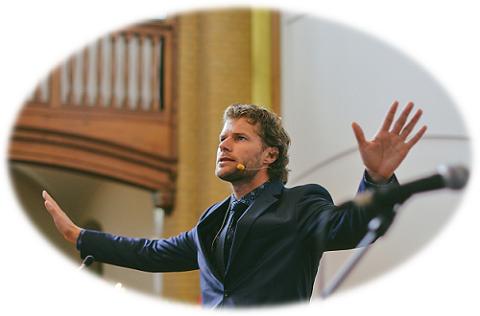Receiving a Blessing: Giving a Blessing Laying On of Hands
Receiving a Blessing: Giving a Blessing Laying On of Hands

At the conclusion of our conversation, she sat a bit closer to me. She asked me, “Shall we close our eyes? Let us open ourselves up to the blessing that God wants to give us.” She laid her hands on me and, after a period of silence, said, “I bless you with the love of Jesus. I bless you with patience, so that you can react better to your children. I bless you with God’s compassion.”
1. Background: Blessing Each Other?⤒🔗
Focusing Our Minds on this Topic←↰⤒🔗
In a number of ways we hear about giving blessings. A father calls his children to him every night and blesses them. People give courses to promote an attitude to a life of blessing, in which blessing each other features prominently. You can practice it and it enriches your spiritual life. The song, “I Bless You in Jesus’ Name,” is very popular. It is being taught to the children; the parents put it into practice.
In 1999, Filippus published a book by Rev. André de Haan, entitled, Nou, het beste...: Over zegenen gesproken [And Now the Best Part . . . Speaking about Blessing]. It emphasizes the power of the biblical word “bless” in a special way. The booklet is meant as a guide to experience the riches of God’s blessing more in the daily life of the Christian. It gives much attention to the attitude to life of the believer as one of blessing. “God wants us to show who he is” (p. 108). That must mark our whole life. But that’s not all. Rev. de Haan argues that each believer may indeed give a blessing to others. The blessing can vary, depending on the need or distress of another person. In that way the attitude to life of blessing becomes real in a literal and audible blessing. Rev. de Haan argues that everyone in the congregation is entitled to bless others because of the biblical idea of the priesthood of all believers (e.g., pp. 18, 41).
The book gives a number of practical examples of the effect such a blessing can have. One is described as follows (on p. 44):
Marja was a baby of six months, who cried every night. Her parents had looked forward to her birth with great expectation and had prayed for her. Extensive examination in the hospital failed to disclose the cause. The only thing the doctors came up with was birth trauma. I and a co-worker played with her for half an hour and as we talked and played with her, we blessed her. From that time on she slept well and did not cry more than other babies of that age.
In that way a blessing, its closeness, brings peace, rest, spiritual growth, and an inner relationship with God. I have experienced many times that people understood better who God is after receiving a blessing.
Questions←↰⤒🔗
What should our attitude be toward this phenomenon? On the one hand, it really speaks to us, because we discern a deeper experience of the blessing of God and it is so badly needed. And many today have a great longing for a richer faith experience. The examples given above indicate, according to many Christians, that the biblical data about blessing can help achieve that. In their opinion, there are possibilities here that allow us better to address the spiritual distress that many experience today. When we employ the tactile process of laying on of hands and audibly express the blessing, the experience of faith becomes more real and richer. So the question arises: have we, as churches, perhaps neglected the riches of the blessing too much?
On the other hand, this development makes people feel insecure. What do you do when someone comes up to you and wants to bless you? Is that allowed? Have we, in our church tradition, indeed neglected the blessing, or are people arrogating to themselves something that is impermissible?
Of course, it is debatable whether the emphasis on blessing arises out of the Bible, or derives instead from today’s cultural milieu. It is undeniable that in our society today people pay more attention to new ways in which to express their feelings than they used to. There is a felt need for new rituals to allow us to channel deep emotions. I think, for example, about the tremendous interest that a silent journey produces. I also think also about the manner in which people search for new rituals to accompany significant events in their lives, such as the process of grieving the death of a loved one, beginning to live together or separating, moving into a new home, etc.

Does the biblical manner of blessing perhaps provide a good answer to this need? Or does the trend of blessing each other place the biblical blessing in the human sphere, in which we listen to our needs, rather than to what God says to us?
We shall need to open the Bible to find a sound answer to these questions. What exactly is the content of God’s blessing? Who may pronounce the blessing and what does that mean? Only by listening honestly to God’s Word shall we find our way in this matter.
2. Biblical Outlines←⤒🔗
The Blessing Is at God’s Disposal←↰⤒🔗
When people receive God’s blessing, it is pure grace that demonstrates that God wants to be their God. The blessing belongs to God and he can dispense it. Therefore, God’s blessing is given only in the context of a personal relationship with him. The blessing is never an impersonal force that people can dispense. It is never a kind of vital force that can be transferred in a magical way. The blessing is always received within the fellowship relationship with the Lord. This is evident, for example, from Genesis 1:22, 28; 2:3; 5:2; 9:1; 14:9; 24:19; 39:5; Psalm 67:7; 128:5, etc. God bestows his blessing. He is the subject matter of the blessing. And he dispenses his blessing in fellowship with him. A well-known chapter that discusses the acquisition of God’s blessing is Genesis 32, which describes how Jacob wrestles with God at Peniel. This story makes clear that it is not a matter-of-course that God’s people will live under his blessing. Jacob said to God, “I will not let you go unless you bless me” (Gen. 32:26). It is indeed pure grace that a person may receive God’s blessing.
But God clearly promises that grace in his covenant between himself and his people. The most important content of God’s blessing of his people can be summarized in one sentence: “I will be your God” (Gen. 17:7, 8; 26:3; etc.).
Because God’s blessing can never be dispensed by human hands, the blessing that people may wish each other, takes the form of a prayer (‘May God Almighty bless you,” in Gen. 28:3, for example). We ask the Lord himself for his blessing. Sometimes the statement that God promises to bestow his blessing is added. In that case the prayer is accompanied by an underlining of that promise.
This happens in Psalm 3, for example. In this Psalm David holds fast to the covenant relationship between the Lord and his people. At the conclusion of the Psalm, David turns his dependence on that relationship into a prayer: “May your blessing be on your people” (Ps. 3:8). Thus, that prayer is based on something; it is plea based on what God promised.
The Priestly Blessing Is Connected to the Service of Reconciliation←↰⤒🔗
A special way in which God dispenses his blessing is in the service of worship. In the Old Testament that was of course the service in the tabernacle and later in the temple.
God commands the priests in Israel to bless his people. The words of the priestly blessing in Numbers 6:24-26 are unique. They were revealed literally to Moses by God. Initially, they could be pronounced only by Aaron and his sons, but later also by the Levites (Deut. 10:8; 21:5).

Leviticus 9:22 tells us that Aaron lifts his hands when he blesses the people. The most important thing is that the blessing must be pronounced from the altar, after the burnt offerings and peace offerings have first been brought. In that way it becomes visible that God’s blessing is laid on his people in the context of the communal bond that is experienced and maintained in the temple service. The blessing has a source: it begins with God. At the same time, the blessing points to the means by which the people receive it: the service of reconciliation.
Various Meanings←↰⤒🔗
When people bless each other, it can mean different things. The meaning depends on the manner in which the blessing is connected to God’s promise, with the source and the substance of the blessing.
The Bible gives examples of the different ways in which people can bless each other. But it always remains clear that the blessing has a specific locus. A familiar greeting is, “May the Lord bless you from Zion” (Ps. 128:5). The force of the benediction derives from the promise of God, which the priests were entitled to lay on the people in the temple, from Zion.
In fact the benediction that people wish upon each other, is derived from the blessing that springs out of Zion. The force of that blessing is dependent upon the bond with the source of the blessing. It can be a very close bond, for example, in the songs of ascents in which the people sing the blessing from Zion to each other on the way to the temple. The bond can also be much more relaxed, for example, when the harvesters greet each other with “The Lord bless you” (Ruth 2:4). Indeed, the word “bless” can be used for every greeting and for that reason the writer of Proverbs warns us not to bless each other too loudly in the morning, so as not to draw attention to our unwashed appearance: “If a man loudly blesses his neigbor early in the morning, it will be taken as a curse” (Prov. 27:14).
Blessing as Prophecy←↰⤒🔗
A few times we read of one of the patriarchs who blesses his sons on his deathbed. That blessing has to do with the unique place of the patriarchs in the history of salvation. It has a prophetic significance: it is a word that is delivered in God’s name.
But even in this context, the blessing is not a kind of guarantee that can be considered separate from an abiding bond with God and an abiding responsibility, Thus, for example, while Isaac blesses his son Jacob first in a prophetic manner in Genesis 27:28, 29, the blessing is repeated in almost the same words in the normal ways as a prayer: “May God Almighty bless you and make you fruitful...” (Gen. 28:3). What was first pronounced as prophecy is now given to Jacob as a prayer. In the result, the unique blessing of Genesis 27 receives extra emphasis.
Blessing God←↰⤒🔗
We, human beings, can not only receive a blessing from God, we may also “bless” God. In fact, this amounts to an acknowledgement of God’s blessing hand and consequently of a magnification of him. By means of the “blessing,” God is glorified. A portion of his glory is thus given back to him, as it were.
Both meanings of the word appear together in 1 Kings 8:14, 15. Solomon blessed the people and then said, “Praise (blessed) be (to) the Lord, the God of Israel, who with his own hand has fulfilled what he promised with his own mouth to my father David.” As far as the writer of this part of the Bible is concerned, the blessing that Solomon pronounced on the people is exactly the same as the prayer that follows. What we perhaps experience as two different meanings is the same thing for the believing Israelite. He uses the same word for both.
The word “bless” is used mostly in this sense in the New Testament. Often it is difficult for us to recognize it as “bless” in modern translations, since they use different words for it, such “praise be to him,” or similar words of thanks or praise.
The Blessing Connected to the Work of Christ←↰⤒🔗
Just as the blessing came to God’s people via the altar in the Old Testament, so also the blessing is given to us through the work of Christ in the New Testament. Accordingly, Jesus’ whole work can be summarized by the word “blessing.” Peter says to the Jews who came running to him and John, “When God raised up his servant, he sent him first to you to bless you by turning each of you from your wicked ways” (Acts 3:26). When Paul comes to Rome, the most important thing he will bring with him is “the full measure of the blessing of Christ” (Rom. 15:29). Those who are permitted to enter his kingdom are addressed specifically as “you who are blessed by my Father” (Matt. 25:34). Outside stand those who are cursed, those who do not inherit the kingdom of God, because they did not live for Christ.
The blessing that Christ places in human hearts is in fact the fulfillment of the blessing that was promised to Abraham. Genesis 12:3 already anticipates that in the future all peoples will be blessed in the same way as Abraham. That means that all peoples will share in that promise of God, “I will be your God” (see also Gen. 18:18; 22:18). That expectation was fulfilled on Pentecost, by Christ’s coming (Acts 3:25; Gal. 3:8ff., 14; Heb. 6:14). This is a “spiritual blessing” (Eph. 1:3). It is worked by the Spirit in people’s hearts.

All these texts demonstrate that the blessing is connected in a unique way to the work of Christ. The blessing signifies that God wants to be with those who are being joined to Christ by faith. In him there is grace, love, and the peace of God (2 Cor 13:11).
Whoever Is Blessed, Shall Bless←↰⤒🔗
When you are blessed by God in this manner, you also want to spread his blessing. That means, when you are connected to God in this way, you want others to have that benefit too and you will do everything you can to show others what it means to “to be with God.’
It is striking that the command to bless others in the New Testament is always directed to the attitude we should maintain toward outsiders. Christians in the New Testament are commanded several times to bless others. Each time, the command is not about our attitude towards members of the congregation, but towards those who approach the congregation negatively.
Jesus says, “Bless those who curse you, pray for those who mistreat you” (Luke 6:28). The parallel text in Matthew 5:44 shows that Jesus is indeed concerned about the attitude of our hearts: “Love your enemies and pray for those who persecute you.’
The apostles command the churches to do the same: “Bless those who persecute you; bless and do not curse” (Rom. 12:14). Paul impresses the same attitude upon the Corinthians and uses himself as example: “When we are cursed, we bless; when we are persecuted, we endure it; when we are slandered, we answer kindly” (1 Cor. 4:12, 13).
Christ himself gave us the clearest example of this: “When they hurled insults at him, he did not retaliate; when he suffered, he made no threats. Instead, he entrusted himself to him who judges justly” (1 Peter 2:23). He, who even prayed for his enemies as he hung on the cross, is the norm and the source from which we can draw strength when we are persecuted. That is why Peter can promote the same attitude to the church: “Do not repay evil with evil or insult with insult, but with blessing, because to this you were called so that you may inherit a blessing” (1 Peter 3:9). When you know what it means that you are allowed to share in the inheritance of God, that is, in the blessing of being with God, you will not oppose evil with evil, but will follow Christ’s example, so that many will come and will also inherit that blessing.
Ultimately, human beings do not dispense the blessing, not even Christ when he prayed for his persecutors. Only the Lord God himself dispenses his blessing. Therefore the point of departure of the biblical guidelines that we discussed above remains in effect, also in the command to bless each other. God controls the blessing entirely.
A Financial Blessing: The Collection for Jerusalem←↰⤒🔗
The fruit of God’s blessing can be given very real expression in the financial support of brothers in sisters in need. Such a gift can even be called a “blessing.” That is what it is called in the original Greek of 2 Corinthians 9:5ff., which uses the word eulogia, but English versions have translated it as “gift.’
The church at Corinth blesses the church at Jerusalem. How exactly did they do that? By setting aside an amount every week by means of a collection and paying it to the church at Jerusalem in due course. In that connection, Paul remarks, “Whoever sows sparingly will also reap sparingly, and whoever sows generously will also reap generously” (2 Cor. 9:6).

This illustrates again that “blessing” is not restricted to only one kind of act. The concept receives a different hue and meaning depending upon the context in which it is used.
3. The Blessing Today←⤒🔗
After considering these biblical guidelines, the question about the place of the blessing in our faith life today arises anew. In what way may we receive and give a blessing today?
In the church service we receive the blessing from God. It is important not to underestimate the meaning of this blessing. I want to begin with that. Thereafter we shall discuss the question whether we are allowed to bless each other outside of the church service.
The Blessing in the Church Service←↰⤒🔗
At the beginning of the service, the congregation receives the Lord’s greeting that is contained at the beginning of various letters in the New Testament. At the end of the service the congregation receives the blessing. This is connected closely to the services that were and are held in the synagogue, just like the rest of the Christian liturgy, which has its roots in the Jewish liturgy.
I don’t know when the words of the priestly blessing were first pronounced by the office bearers in the Christian church. The fact that the officer bearer, who leads the service, pronounces it has to do with the concept of office that became fixed in the first centuries of the Christian church.
The Bible itself provides a number of clear indications of this. The main difference between the Old and the New Testament derives from the fact that the Lord Jesus Christ is the complete fulfillment of all that the priests, kings, and prophets had to do in the Old Testament. Hence, the structure of the offices in the Christian church could no longer be the same as in the Old Testament. Many elements of the office can apply to all believers. When you are connected to Christ by faith, you will reflect his office of priest, prophet, and king. Those are the riches of the church after Pentecost. And so, in the New Testament, something becomes visible of the place that God had intended for all his creatures. He had intended that they should serve him as priests, praise his name as prophets, and represent him as viceroys in his creation (cf. Acts 2:17ff.; Rom. 12:1; 1 Peter 2:9; Rev. 2:5).
Nevertheless, the Lord again appointed office bearers in his Christian church from the beginning, in order to equip the saints for service (Eph. 4:12). The office bearers have the task of stimulating and coordinating life with the Lord, and to nourish and build up the church. And so they give spiritual direction and are accountable for that. They are responsible for tending the flock and guarding against heresies (Acts 20:28-30). One of the means to that end is the explanation and application of the Word (e.g., 2 Tim. 3:14-16). The elders who apply themselves to this are made doubly responsible and are assigned a concomitant measure of authority. This authority does not derive from their personal characteristics, but is given to them for the special service they perform of explaining and applying the Word of God (see, e.g., Eph. 4:11-16; 1 Thess. 5:12, 13; 1 Tim. 5:17-19; Heb. 13:7; 1 Peter 5:1-5). Their task places them close to the Word and therefore they are responsible for passing on that Word. Some elements of the tasks of the priests and prophets in the Old Testament, find resonance in their work.
The biblical data demonstrated that there are different greetings and blessings, with a different content and meaning. It also became apparent that the priestly blessing of Numbers 6:24-26 has always occupied a special place for God’s people. This blessing could be pronounced only by office bearers whom God had appointed, and only in close connection with the whole of the worship service, in which the service of reconciliation was of great significance.
In agreement with that, the church in the New Testament allowed the office bearers to pronounce the priestly blessing at the end of the worship service in which the Word of reconciliation is proclaimed. Since time immemorial, God connected his blessing to the administration of reconciliation.

The words of the blessing are accompanied by a gesture. That has been the case since the beginning, when Aaron blessed the people in Leviticus 9:22. There he lifted his hands toward the people and thereby symbolized that the laying on of hands applied to all the people.
It is, therefore, totally biblical when the priestly blessing and the apostolic blessing (2 Cor 13:14) are bestowed on the congregation at the end of the church service, together with the assurance of God’s promise: as certainly as the hands of the minister of the Word are laid on you, so certain is God’s promise to you.
Minister and Elder←↰⤒🔗
The question arises whether the pronouncement of the blessing at the end of the church service may be done only by a minister who administers the Word of God. There has been a discussion in the Reformed Churches (liberated) about the question whether an elder may pronounce the blessing in the same way. The main reason why the blessing is administered is the promise of God, which is connected to the service of reconciliation. That does not depend on the person of the office bearer.
In a reading service the congregation also gathers round the Word of God and in it the service of reconciliation is fully present. Hence, those churches drew the conclusion that an elder may also pronounce the blessing.
In other Reformed churches no strict rule has been adopted. The practice was adopted that only ministers of the Word could pronounce the blessing. Therefore, in reading services the elder prays for the blessing, which is also the practice in the synagogue if no priest is present.
In addition to the blessing that is pronounced at the end of the worship service, in our churches we also pray in a special way for God’s blessing on various occasions. This happens when a marriage is solemnized and when office bearers are ordained. It can also take place in a service in which people publicly profess their faith. In a number of liturgical forms, the office bearer pronounces words by which a blessing is pronounced that is connected to the clear promise of God.
In some churches the practice has been adopted to underscore that blessing by the gesture of laying on of hands. That can represent the presence of God visibly and more clearly. The laying on of hands can make visible what is expressed in the words of the form. For example if the ordination form says, “The Almighty, merciful God and Father of our Lord Jesus Christ strengthen you by his Holy Spirit,” the laying on of hands implies that God himself heard the positive responsive of the person being ordained and wants to add his blessing on it, if it was spoken in faith.
The laying on of hands underscores for us the unique nature of the moment. But for that reason, we must be careful not to abuse it. The unique nature does not lie in the gesture, but in what God promises in that moment, as we can hear from his Word. We should also avoid giving the impression that it is the minister of the Word who dispenses the blessing.
On a mission field I asked a colleague why he did not raise his hands after every service. He said that the people among whom he worked would then tend to assign too much importance to him as mediator of the blessing. To avoid that, he sometimes pronounces the blessing with uplifted hands and sometimes as office bearer without lifting them. The purpose is to point the people always to the Word of the speaking and blessing God himself.
Experiencing the Blessing in the Church Service←↰⤒🔗
The more the service of worship becomes the focus of life, the more will we actually experience that the Lord’s blessing enriches our life. In the service of worship we are fed, together with the congregation of the Lord, with the Word of God, by Jesus Christ himself. In that way I begin to see what it means that God wants to be my God. That is essential for the way in which the Bible speaks about the blessing.
When I make that my own, I will see what it means to live under the blessing of the Lord. In that way I can recognize that blessing in my everyday life. In this context I am thinking in the first place about the spiritual connection with Jesus Christ, about the reconciliation of my life with God, and about God’s promises for the future. But I also think about the fact that the Word points out a direction for my life that becomes apparent in the gathering of the congregation. In that way I can truly experience that he makes my paths straight when I know him in all my ways. I can experience material enjoyment as a blessing, just as that also happens in God’s Word. But at the same time I realize that this can be a great danger and can become a curse. If my entire life is not focused on God, all the spiritual and material riches are turned into a curse. If all of life is experienced with the Lord, I will see the Lord’s blessing in riches and poverty, and in health and sickness, because he is with me. That is why always focusing again on the origin of the blessing is of the greatest importance.

When we experience God’s blessing in that way, the blessing will never become a force that is ours to dispense. Moreover, it is not the case that God’s blessing can only be observed directly in positive circumstances. The blessing gives us a promise, but also poses a clear question: Is the Lord, who dispenses the blessing, truly the focus of our life? To answer that question it is always necessary that we gather with the congregation to open God’s Word.
Blessing Each Other?←↰⤒🔗
May believers bless each other? After studying the biblical data, the answer is simply: it depends on how a person understands the blessing.
When you bless each other in the manner Boaz blesses his harvesters (“The Lord be with you!’) and they reply (“The Lord bless you!,” Ruth 2:4) it makes the greeting you give each other so much more profound.
The believer who is connected to Jesus can even go further. Just as people in the Old Testament wished each other the blessing of the Lord from Zion (Ps. 128:5), so also believers in the New Testament can wish each other the blessing that comes to us in Christ. Undoubtedly, the believers in the first Christian church greeted each other in that way. The believers attached great significance to the greeting at the end of the apostolic letters, which often took the form of a blessing, such as “grace to you,” or something similar. Such words would have accompanied the encouragement given to the members of the church to greet each other. Sometimes such a greeting would be accompanied by a gesture, such as, “a holy kiss” (2 Cor. 13:12).
The gesture of laying on of hands is not mentioned in this context. That is reserved for a specific blessing of a special character. Twice Paul speaks of the manner in which Timothy was commissioned as office bearer to the Lord. That was accompanied by the laying on of hands, in which Paul also participated (1 Tim. 4:14; 2 Tim. 1:6).
In the Jewish tradition, the gesture of laying on of hands is more common. It demonstrates the desire to pass something on and makes the closeness tangible. Thus, for example, Jewish parents lay their hands on their children on the eve of the Sabbath, when they bless them. It is interesting to listen to the words of the blessing. It has the form of a prayer, just like the blessings we find in the Bible. For a boy the blessing is: God make you like Ephraim and Manasseh. This harks back to the prophetic words of Genesis 48:20, which says that in the future Israel will pronounce the blessing with these words. For a girl the blessing is adapted as follows: God make you like Sarah, Rebecca, Rachel, and Lea.
No matter how one appreciates the laying on of hands, it will be apparent that all the forms of blessing we discussed consist of a wish and a prayer for the blessing that only the Lord himself can give. That applies to the Bible and also for the Jews. And it is no different for us today. The blessing derives its meaning from the promise of God. A promise can never be made dependent upon a blessing. It is always the other way round. Otherwise God’s work would be dependent on the work of human beings. That is never the case.
I Bless You With...←↰⤒🔗
In light of what we have just discussed, I have great difficulty with the manner in which the blessing is given by some people. If I give my neighbour a blessing in the form of a specific promise, that raises enormous expectations. I know and have experienced that the Lord can also perform miracles today and can fulfill specific hopes. But the Bible does not give us any occasion to raise such expectations, as if we were entitled to bless each other with something specific. A form such as, I bless you with the love of God, or a similar expression does not appear in the Bible.
For that reason I strongly advise people to avoid the use of the word “blessing” if it is not connected to a clear commission of God. A person who blesses does no more than a person who prays for a blessing and wishes it on another person. The form that befits it is the Lord bless you. God himself is the subject. He dispenses the blessing.
It would be totally wrong for a person to suppose that she can dispense of the blessing. It is wrong not only about the blessing itself, but it can also distort mutual relationships. If a father blesses his child daily, it is possible that the father exercises a spiritual power over the child that goes beyond the relationships described in Ephesians 6. The child can feel himself spiritually dependent upon his parents and the danger of manipulation is then quite real.
The formulation, I bless you with . . . is technically more about a power to bless than a prayer for blessing. Intrinsically, that conflicts with what the Bible teaches about the blessing. And when by means of a laying on of hands the suggestion is raised that there is an actual transference of power via the laying on of hands, you have crossed the boundary into the magical arts in an unbiblical manner.

This way of thinking places the blessing in the framework of a magical faith experience that is in sharp contrast to the intention of the blessing as God’s Word speaks of it. In the religions that surrounded Israel, a blessing or a curse could work magic as an impersonal power. But God’s people did not surrender themselves into human hands in the blessing, but into God’s hands.
Passing on a Blessing←↰⤒🔗
The New Testament makes clear that the most important way in which believers may pass on God’s blessing to others is to be found in their attitude to life that actually becomes visible to the people around us. I can pass on God’s blessing only if I first draw from the source of the blessing myself. That will become apparent in the manner in which I deal with prosperity and adversity, with gifts and shortcomings. The blessing will become apparent not only in prosperity; that would give a distorted image of life with God. It is important that we show that the strength of our lives does not lie in our glory, but in the grace that I experience especially in weakness. Also in the manner in which I deal with guilt, the meaning of God’s blessing must become apparent. The blessing does not turn us into different people, but into people with a different perspective. That is why we can even “bless” those who have no concept of what it is that motivates us.
That is the first thing the Bible points to in the context of passing on a blessing. Moreover, in the congregation I can also be a blessing for others by praying for a blessing and to point them to the blessing. In connection with the service of reconciliation, that can be expressed by a visual laying on of hands in God’s name. So long as it is really understood that this is not something over and above what God has promised, but refers to and is derived from it.
4. Conclusion←⤒🔗
Thus, the significance of the blessing today depends on God’s promise. The blessing can never go further than what God has promised. By means of the blessing that can be laid on others in the framework of the service of reconciliation, God’s promise—that he will be our God—is underscored. The gesture of laying on of hands makes that promise visible and nearer to us. In the blessing, we pray to God for the fulfillment of his promise and, at the same time, the congregation is assured that God will indeed fulfill it. That is why we are always asked to receive the blessing with a believing heart (e.g., lift your hearts on high) and why the gesture of laying on of hands belongs to the assurance.
The blessing can also have significance outside the church services. Believers may remind each other of God’s promise and assure each other of it. Actually, that happens when someone sends you a card that points to God’s rich promise and blessing and which tells you that the sender is praying for you. Those tremendous riches can be summarized succinctly with the words: God’s blessing! By referring to God’s blessing, we refer each other to God who blesses himself. That’s what it’s all about. Only he dispenses his blessing.

If this biblical concept is not really understood, there is a real danger that a distinct act of blessing can be interpreted as a kind of magical act. Such an act works the exact opposite of what the blessing means. Directly or indirectly, people then become dependent upon the hands of people and consequently are drawn away from a complete trust in God’s hands and in God’s promise that is sufficient for all of life.
We may praise God for that promise, which is most profoundly summarized with the words, “I will be your God.” We can experience the blessing at its highest in such praise. And then God is blessed for his blessing.
Questions for Discussion←⤒🔗
-
Can you state in one sentence what the blessing of God means for you? Discuss the differences in emphasis and experience that may exist between the several answers.
-
Can we lay claim to God’s blessing by passing it on to another person in a particular way? Discuss the difference in the formulation of: I bless you with God’s love and the Lord give you his blessing.
-
Do you experience a difference between the blessing pronounced at the end of a church service and the blessing pronounced on you directly by another person? If so, can you explain exactly what that difference is?
-
In your experience, what is the connection between God’s blessing that we receive and the blessing by which we may bless God?

Add new comment